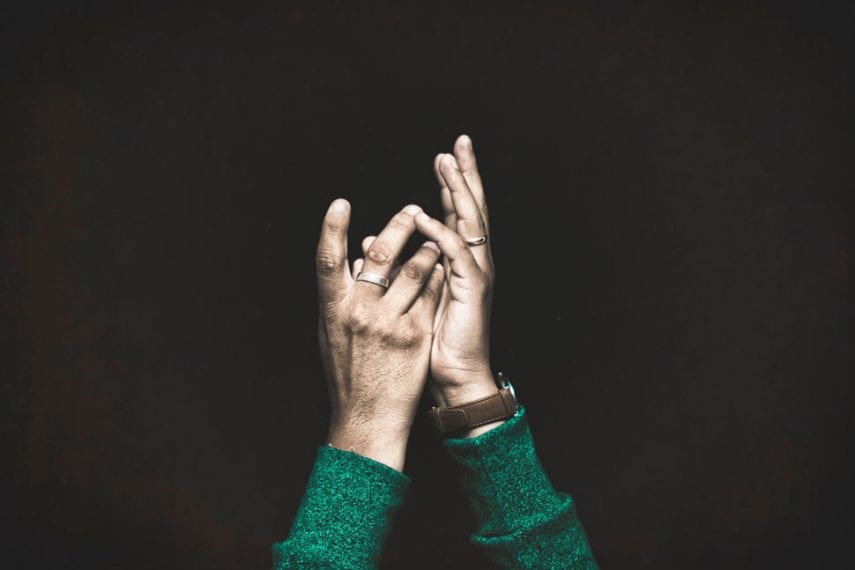OCD Awareness Week: Recognizing and Legitimizing The Lesser-Known Forms of OCD

In popular culture, OCD is often represented as an obsessive need for structure or a persistent attention to detail, but the reality of OCD is that it manifests in a wide variety of ways. Because they’re more taboo, many lesser-known forms of OCD are underrepresented in the general understanding of the disorder. One important way to widen this understanding is to acknowledge these forms openly, talking honestly about them as a way to reduce the stigma that surrounds them.
From the outside, my husband and I seem like any other couple. We argue, take our children to soccer games, do yard work together on the weekends. The usual. What’s unusual about us is that my husband lives with obsessive-compulsive disorder, and while we manage it, together, friends we’ve known for years know that it’s a struggle.
For my husband, it started with the things we usually associate with OCD: an aversion to germs, needing everything to be in order, and a tendency towards perfection. He’d organize a box of legos by size, shape, and color, forgetting that they were meant to be used for building, and any disturbances to his arrangement would cause him intense, overwhelming anxiety. Though he learned to manage that impulse over the years, the disorder manifested itself in different, unexpected ways, ways we don’t often see in TV or movie representations of people who struggle with OCD. In his teens, he started having terrible thoughts about apocalyptic catastrophes (often called “intrusive thoughts”), and worse, started to believe that they might happen if he kept thinking about them.
Shedding Light on Lesser-known Experiences of OCD
During OCD Awareness Week, it’s important to acknowledge that the way we see OCD represented in the news, other media, and even among our own social networks often fails to include the experiences of many who live with the disorder. The first step in rectifying that problem is recognizing those experiences, validating them, and acknowledging their impact on real human lives. Though it isn’t a comprehensive list by any means, the following are some of those experiences.
- A deep, consuming fear of harming or killing someone they love. In an essay for the ADAA, one sufferer wrote that her OCD “doesn’t involve germs or orderliness, the symptoms typically portrayed in media.” “My OCD,” she wrote, “is about the fear of harming others, making me to think that bad thoughts will cause me to hurt people.” People who struggle with this fear—often called “harm OCD”—have an intense fear that the thoughts they have about harm means that they will hurt someone, regardless of whether they have any aggressive tendencies or history.
- An intense obsession with religious beliefs or morals. Often referred to as “scrupulosity,” this form of OCD causes people who struggle with it to believe that they’ve sinned in some way, or that they will. Convinced of this, they develop compulsions (ironically, these are often called rituals within the OCD community) to relieve themselves of that anxiety, such as obsessive hand-washing rituals or prayer. One woman who struggled with scrupulosity was so worried about desecrating the Torah scrolls in her synagogue that, among other compulsive rituals, she called the synagogue to confirm she hadn’t carried out her obsessions accidentally.
- An overwhelming fear of doing something socially unacceptable. Someone who struggles with this form of OCD might worry that they will blurt out inappropriate things without warning, steal something, or cause an embarrassing public disturbance. To combat that anxiety, they might avoid social situations in which it could happen, or, to help them relieve it, develop compulsions like “checking” their memory (to make sure it hasn’t happened already) or needing constant reassurance from friends and family.
- An excessive desire to hoard useless objects and possessions. As with all forms of OCD, this desire often stems from fear: that someone will be hurt if an object is thrown away, that the object could be needed in the future and should, therefore, be kept, or that throwing the object away would be an emotional loss to the sufferer. This last fear, which can result in what’s called “emotional hoarding,” sometimes develops after someone experiences the loss of a loved one and learns to associate their presence with the objects they left behind.
Call for a Free Confidential Assessment.
877-727-4343Validating Alternative OCD Experiences Opens Our Understanding of the Disorder
These lesser-known manifestations of OCD may be less prominent in our minds and in popular culture, but they aren’t any less real for the people who struggle with them. Because they’re less acknowledged, it’s critical that we recognize them openly and honestly because doing so widens the scope of our understanding of the disease and validates the struggles of the people who live with it. It’s not an easy task, but it’s an important one, and it’s one that stands to benefit the people whose experiences with OCD are currently the most marginalized.
Regardless of the way your (or a loved one’s) OCD manifests itself, living with it can be debilitating, and learning how to manage it on your own can seem like an impossible prospect. Undergoing treatment for OCD in a residential treatment center gives people who suffer from OCD an opportunity to deal with the disorder in a validating and supportive environment, one that employs a comprehensive clinical modelintegrated with a network of innovative therapies. It’s that kind of persistent, sweeping support that can make a world of difference to people who feel as if they’re living with unconquerable OCD.
Bridges to Recovery provides comprehensive treatment options to people living with OCD as well as other co-occurring mental health disorders and substance use disorders. If you or a loved one is struggling with OCD, connect with us today to learn more about how we can help you learn to manage the disorder and move forward with your recovery.
Lead Image Source: Unsplash user Christian Newman






